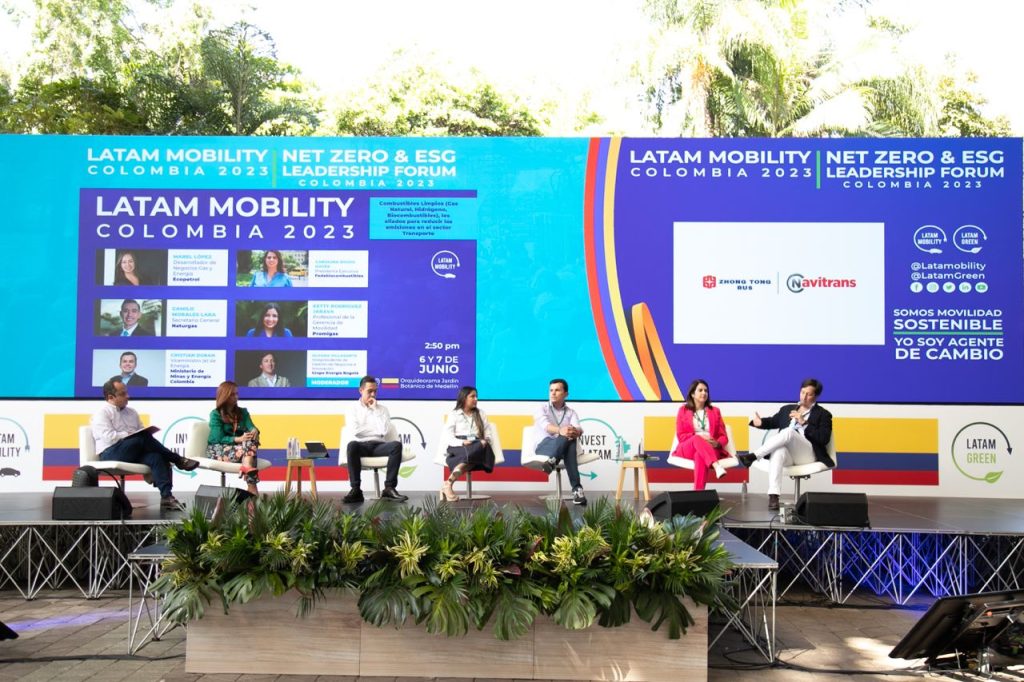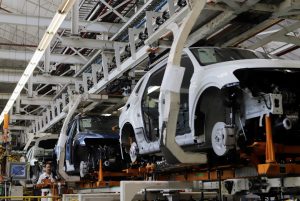Once again, the city of Medellin became the capital of sustainable mobility in Latin America, after the meeting “Latam Mobility: Colombia 2023“, which brought together the most prominent leaders, companies and government representatives who discussed the progress and challenges of the sector in the country and the region.
Among the agenda of discussions and presentations scheduled by Latam Mobility, the largest sustainable mobility community in Latin America, was the panel “Clean Fuels (Natural Gas, Hydrogen, Biofuels): Allies to Reduce Emissions in the Transportation Sector“.
The panel was attended by Eduardo Enriquez, Vice Minister of Transportation of Colombia; Cristian Duran, Vice Minister (e) of Energy of Colombia; Mabel Lopez, Gas and Energy Business Developer of Ecopetrol; Carolina Rojas, Executive President of Fedebiocombustibles; Camilo Morales, General Secretary of Naturgas, and Ketty Rodriguez, professional of the Mobility Management of Promigas.
The moderation was in charge of Álvaro Villasante, VP of Business Management and Innovation of Grupo Energía Bogotá, who opened the debate with a reflection: “Sustainable mobility is a reality that does not have only one side, it is electric, it is hydrogen, it is biofuels, it is natural gas. Colombia is a country that has all these options, and very few countries can have this great variety of vectors on its table”.
You may also be interested in: Renault, Toyota, BYD, General Motors, Seres and Los Coches Strengthen Commitment to Transition to Hybrid and Electric Vehicles
Business Lines
Mabel López, Ecopetrol‘s Gas and Energy Business Developer, commented that the company has its Strategy 2040, which is carried out through three essential business lines: hydrocarbons; transmission and roads, and the most recent, emission reduction solutions.
In relation to emissions reduction, López explained that for the last three years they have been working to reduce emissions in the country. “In Medellín, we managed to reduce between 10% and 15% of PPM (parts per million) particles in diesel. This was an idea that was born in Ecopetrol, to improve the quality of life of Colombians. In addition, we are conducting tests to generate renewable fuels, blends, and we remain committed to natural gas, an essential fuel”.
In relation to progress, Mabel López indicated that there are several pilot projects at the Cartagena and Barranca refineries to produce diesel from a fossil blend with vegetable oils. In addition, the project of gas-powered tractor-trailers coming from the plant, without mechanical intervention, is in the test phase, as well as the manufacture of 36 trucks at the Esenttia subsidiary. “In the passenger segment, we launched the first 100% natural gas interdepartmental bus in the city of Bucaramanga. In addition, we are making progress in the Caribbean Technological Innovation Center, the first mobility park that we are going to develop.”
Modernization
Eduardo Enriquez, Colombia’s deputy minister of transportation, said that the government is seeking a formula that will make it possible to comply with the commitments made in the Paris Agreement. “Sustainable and intelligent mobility goes hand in hand to reach agreements. Today we are moving with a Development Plan, which counts on low and zero emissions, and with ambitious goals such as having 600,000 electric vehicles in circulation.”
In addition, Enriquez pointed out that they are working on articulating the public and private sector, along with new processes. “We have the fundamental commitment so that all vehicles entering the country have the homologation and are ready to roll. Likewise, we are committed to the public passenger transportation system, with better information systems, service and control of the entire fleet that exists in the country“.
“We seek to continue encouraging the modernization of the fleets, and at the same time, we are thinking about the new technologies that the country needs. We must adapt to the new needs and platforms, as well as take advantage of the potential we have at hand, to improve the service. We have a Development Plan that was largely built with the private sector, and we seek to comply with what Colombia needs today and the agreements signed in the international context”, concluded Vice Minister Enriquez.
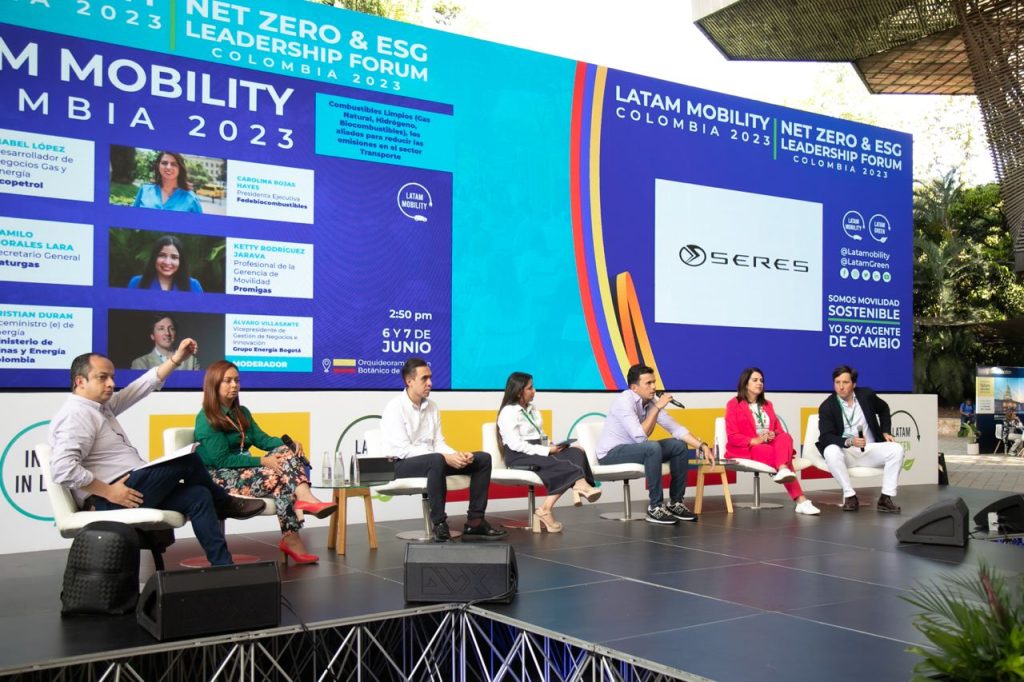
Objective: Reduce Emissions
Carolina Rojas, representative of Fedebiocombustibles, began her participation by pointing out that in 2022, three million tons of greenhouse gas emissions would be reduced in Colombia thanks to the use of biofuels, which would be equivalent to removing one million vehicles powered by fossil fuels from the market.
“Currently, all gasoline vehicles have a bioethanol blend, which this month is 7%. In addition, the cargo being transported has a 10% blend. Each of the users in Colombia makes a contribution to decarbonization through the consumption of biofuels. Therefore, they are part of the answer and an ally for the reduction of emissions in the transportation sector,” said Rojas.
“On the issue of cost, these fuels are not subsidized, so each blending point is a saving for the treasury. We have calculated that only with the biofuels consumed last year, 2.9 billion pesos were saved in subsidies alone. It is an important discussion for fiscal stability and what we want is to consolidate these blends for cost, environmental and public health reasons”, emphasized the representative of Fedebiocombustibles.
Opportunities and Challenges
Cristian Díaz, Vice Minister of Energy and Director of Electrical Energy of the Ministry of Mines, expressed the importance of the relationship between the government sector and companies in the transition to sustainable mobility. “Colombia has many opportunities to move forward, from different areas, although we must improve so that they continue to materialize. It is not just one type of fuel, there are several options that we have at hand.”
The vice minister pointed out that the Ministry of Energy has an inter-ministerial Mobility Table that seeks to organize the entire sector. “We are trying to coordinate so that everything moves forward. We have talked with guilds, and we will seek to open a space for feedback with the companies, to know what needs to be adjusted or changed.”
Regarding fuel, Diaz said that “we have been working on fuel quality. Thanks to the refineries, we have the quality we have today. In addition, we are strengthening the issue of blends, where we have biodiesel in a 10% blend on a permanent basis, and we have pilots of 20%. However, we are still not able to guarantee our bioethanol blend, so we are working on generating incentives and guarantees for companies and distributors to produce a national vector”.
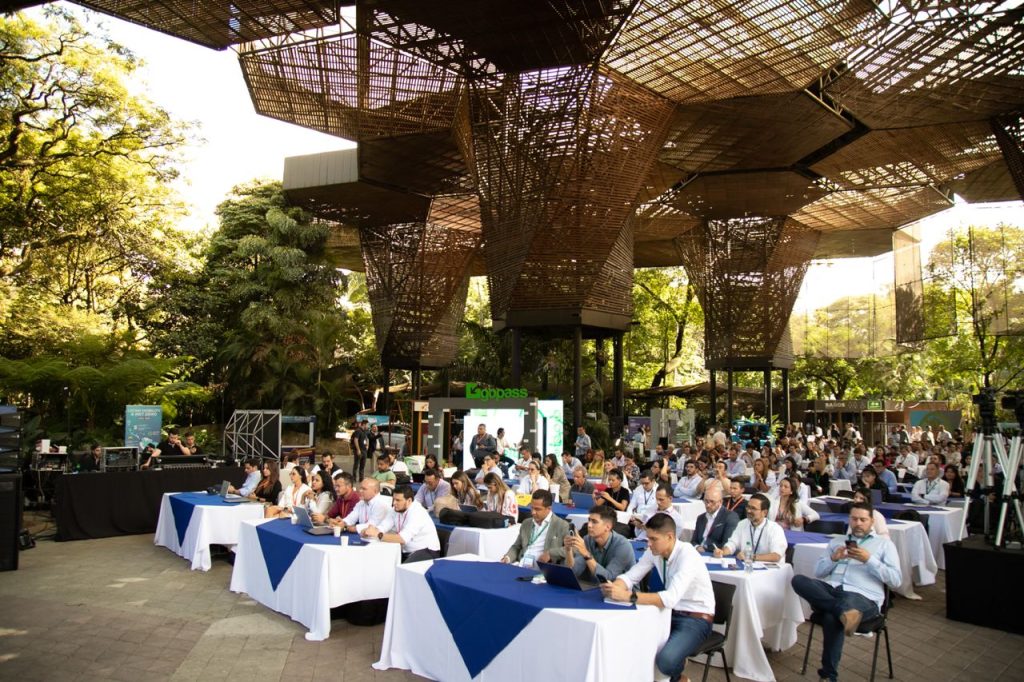
Betting on the Economy
Camilo Morales, General Secretary of Naturgas, explained that the Colombian Natural Gas Association has 29 affiliated companies that represent 98% of the market in the country; it generates close to 100,000 jobs, represents 1% of the Gross Domestic Product, and produces one trillion pesos to the General Royalties System by transfer.
“Natural gas is the energy source most consistent with the needs of the country, and plays a fundamental role: it reduces inequality gaps, since it reaches more than 36 million Colombians; it helps in the fight against hunger, because it can be converted into molecules to contribute to the production of fertilizers, and drives industrialization, as an efficient and reliable element, and it is also present in the mobility sector”.
Among the needs of the sector, the Naturgas representative pointed out that it is necessary to work articulately in the implementation of the use of natural gas. “A regulation is required to increase our presence in the regions and territories, as well as a natural gas refueling infrastructure, incentives and a reduction of VAT tariffs on materials and equipment needed for compression at refueling stations. It is crucial, because the more stations we have, the more we will connect the national territory with low emissions”.
“Gas Truck”
Ketty Rodríguez, representative of Promigas, indicated that the company has been connecting different energy solutions for 48 years. “Natural gas has gained prominence for its operational efficiency, as it reduces between 98% and 100% of particulate matter, and 30% of CO2 emissions, so it has a relevant role in the advance towards sustainable mobility.”
Rodríguez explained the “Gas Truck” model carried out by Promigas. “Between 70% and 80% of heavy transport is concentrated in independent truck drivers, who find it difficult to access bank loans to renew their vehicles. A group of gas companies in Colombia together with an investment fund created Gas Truck, a financing product with which this segment of customers can access credit to change their vehicle for one that uses a more environmentally friendly fuel.”
“Gas Truck has a goal in three years to transform or benefit 1,400 drivers to acquire their vehicles dedicated to gas, and in a 10-year horizon, about 12,500 vehicles that would represent 3% of the country’s cargo fleet, saving the subsidy that the nation makes in relation to diesel,” explained the representative of Promigas.
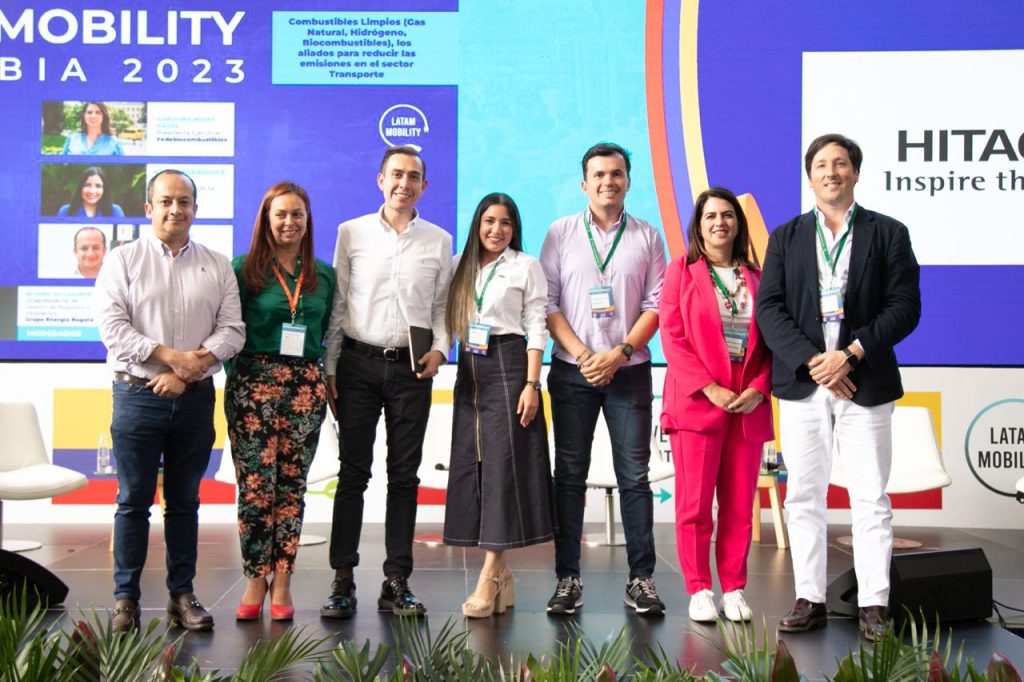
Below is the video of the first day of “Latam Mobility: Colombia 2023“:




